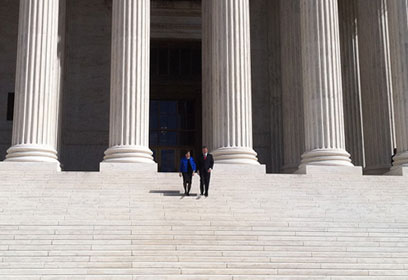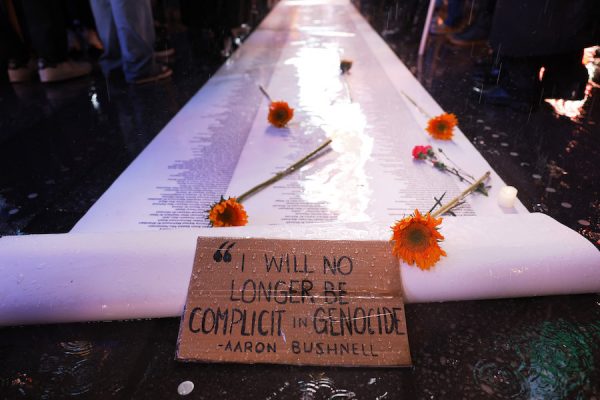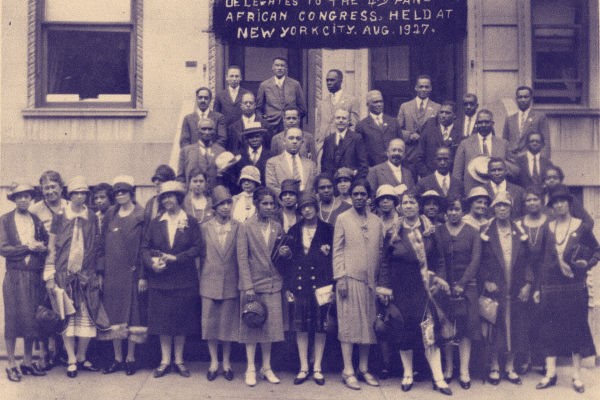According to the U.S. Supreme Court decision in McCutcheon, et al. v. Federal Election Commission, striking down overall limits on political donations, each of us has “a right to participate in democracy through political contributions.” Chief Justice John Roberts, opening his opinion in the case, puts it this way: “There is no right more basic in our democracy than the right to participate in electing our political leaders.”
When Roberts says “basic,” he means it. This right of participation is categorically prior even to the right to vote, which is but one means of exercising the underlying right to participate. Other means, which Roberts ranks no lower in importance than voting, include running for office, volunteering for campaigns, and—the key issue in McCutcheon—contributing money.
Ordinary Americans may be surprised by this description of voting’s status in a democracy. Our civics has encouraged us to think of voting as special. Not that we disdain the right to run for office, but such a small number of us can exercise that right that we can’t value it in the way we do the right to vote. By the same token, it seems natural to harbor warmer feelings for voting than for making campaign contributions, especially to the extent that McCutcheon now enables.
But Roberts’s opinion suggests we have misled ourselves, that the gut definition of democracy, with voting the signature act, is a naïve one.
He has plenty of justification. The right of participation is indeed an old doctrine of republicanism, pervasive in modern political thought. The Declaration of Independence famously refers to government deriving its just powers from the consent of the governed. Because consent is registered largely through a process of choosing legislators, the right of participating in elections has been enshrined in international law, the UN Charter, human rights manifestos, and elsewhere.
But it is important that the McCutcheon opinion not rely on the Declaration or the UN Charter or any document but the Constitution. Roberts sees participation specifically as a constitutional right, one from which other constitutional rights flow.
That is despite the fact that the right of participation is not expressed in the Constitution. Other constitutional rights not expressed in the Constitution—a right to privacy, say—provoke skepticism in some conservatives because such rights are said to be “penumbras” formed by “emanations” of the explicit rights. This unexpressed right of participation, by contrast, doesn’t emanate from any explicit right. Explicit rights flow from it, according to Roberts. We can’t see it, but we know this right exists in the Constitution because such things as the right to vote and certain aspects of free speech, which are explicit in the Constitution, exist because of it.
Roberts’s way of looking at the right of participation both draws support from and lends support to time-honored conservative ideas about equality. Roberts quotes Justice William Rehnquist, for example, in a 1985 decision, to the effect that “someone who ‘spends substantial amounts of money in order to communicate [his] political ideas through sophisticated’ means” is exercising the same right of free speech as “a lone pamphleteer or a street corner orator in the Tom Paine mold.” You and a billionaire, that is, are equal in the sense that Congress has no more power to limit the billionaire’s gigantic contributions than it does to limit your small ones. The unequal impact you and the billionaire have on the political process is an effect of an absolute equality in exercising constitutional rights.
That view of equality is enviably straightforward. The structural relationships that Roberts descries among equality, rights, and laws, and the neatness of the conclusions that must result, he suggests, from appreciating those structures, present us with a Constitution of a calm mechanical beauty. The McCutcheon opinion is nothing if not logical, for the Roberts Constitution is nothing if not orderly.
You and a billionaire are equal in the sense that Congress has no more power to limit the billionaire’s gigantic contributions than it does to limit your small ones.
Viewing the Constitution in historical terms, by contrast, can make what Roberts calls our basic rights seem less than entirely logical. The disorderly process by which such rights became constitutional throws strange light on Roberts’s attempt to cast the McCutcheon decision as an effort to protect American democracy.
While it is true that the founders who wrote the Constitution in 1787, and then amended it in 1789, believed in a right of participation, they did not think about this right in the way Roberts does: as something enjoyed equally by all citizens. Conservatives often point out that when the founders said, “All men are created equal,” they never meant people to have equal outcomes. They also didn’t mean to give people an equal right to participate.
There is an equality, the founders believed, with which all men are endowed at creation, and it involves those famous unalienable rights: life, liberty, the pursuit of happiness. Governments, however, which the Declaration says are instituted in order to protect those unalienable rights, involve explicit political inequalities, which the founders saw as good because they are necessary to protecting the basic rights.
The founders had no regard, for example, for universal access to the right we treasure today because it makes us equal: the vote. The founders’ Constitution presumes inequality in elections. The president is chosen by electors; each state chooses the electors by whatever means it prefers, and the citizenry need not be consulted. Not that citizens’ voting is absent from the founders’ Constitution: legislators in the House are chosen by the people of the states. That popular-choice requirement didn’t mean that all people in a state must have access to the voting process; quite the contrary. The founders presumed, nearly to a man, that the states would—and should—limit the franchise to the propertied.
And most of the states behaved as expected. The franchise was held by a limited number of white men, plus a far more constricted number of women and free blacks. Running for office required meeting even higher property qualifications. Religious qualifications created further barriers to participation. No equal right either of participation or of voting was enforceable via the Constitution.
Soon suffrage for unpropertied white men did come about, but not by invoking constitutional rights, since the Constitution didn’t contemplate voting rights. The state legislatures, for their own reasons, passed laws and amended constitutions to remove property barriers for white men. Largely accomplished by about 1830, that process by no means heralded loosening of restrictions on others. Propertied women had lost the right to vote in every state as early as 1807. Suffrage for free black men, always embattled, narrowed drastically through the early nineteenth century. The Constitution had nothing to say about any of that.
Not elegant legal reasoning but cataclysmic war created the radically different Constitution we know today. In 1868, as a result of Union victory in the Civil War, the Fourteenth Amendment launched a thoroughgoing revision in how we read much of the Constitution. The amendment made equal citizenship and equal protection of the law explicit constitutional concepts for the first time.
In that context, federal courts began a long, slow process of construing the first ten amendments’ protections, including freedom of speech, as restrictions not only on Congress but also on the state governments. Legal scholars call this process “incorporation,” and we are familiar with the results. States today have no more power than Congress does to establish religions, restrict speech, or control the press.
The Fourteenth Amendment referred, also for the first time in constitutional history, to a right of all adult men to vote in every kind of election, regardless of property ownership, race, and nearly any other condition. The amendment thus enshrined the progress that white men had made via the state laws, and extended it to black men, while acquiescing in a right of the states to disenfranchise women.
In 1870 the Fifteenth Amendment more assertively brought male voting rights into the Constitution. Invalidating state laws and practices intended to deny black men the right to vote, the amendment created a federal power to ensure that the class of voters protected by the Fourteenth Amendment could nowhere be denied voting rights on the basis of race or former enslavement.
It is well known that, in practice, the Fourteenth and Fifteenth Amendments and related federal voting laws quickly became a dead letter in the Southern states. The enfranchisement of black men met with vehement obstruction, which continued throughout much of the twentieth century. Similarly, the establishment of American Indian citizenry in 1924 began a tortuous process of striking down and repealing states’ barriers to Indian voting. Only in the 1960s was that process legally complete, and, as with black and other minority voting rights, efforts to keep Indians from voting have continued into this century. And it was not until 1920, fifty years after ratification of the Fifteenth Amendment, that women won enfranchisement via the Nineteenth Amendment, also against strident opposition.
The modern Constitution, the one we think of as democratic, did not flower naturally and gloriously from a founding seedling. Its emergence instead looks spasmodic, prejudiced, opportunistic, unpredictable, at times violent, always strange.
Because Justice Roberts assesses the Constitution not narratively and historically but structurally and taxonomically, the opinion in McCutcheon is bulletproof. Thanks to the underlying equal right of participation, the Roberts Constitution—neither strictly “originalist” nor liberally “living”—resolves and pacifies all the wild action around voting and equality that has marked the document’s veering career. The Roberts Constitution may serenely apply itself, without tension, to all relevant issues.
The most significant impact of campaign money is not on the electoral process but the legislative agenda.
The McCutcheon opinion thus rises above effects of money in politics that ordinary Americans fear may be deleterious to a democracy that, viewed in historical terms, can look hard-won, fragile, and forever slippery. Nowhere in his opinion does the judge wrestle with widespread complaints about big money’s potential for undoing the struggle of generations seeking a more complete democracy. To Roberts, people’s objections to gigantic campaign contributions are inspired only by how annoying TV ads get during campaign seasons.
Those who make such contributions evidently discern other, more profound effects of money on the political process. They persist in believing that giving money is not merely one of the options citizens have for exercising the right of participation, but the best option.
That is because the most significant impact of campaign money is—Roberts to the contrary—not on the electoral process but on something that matters even more: the legislative agenda. In his 2011 book Republic, Lost Lawrence Lessig shows clearly how the issues that draw legislators’ attention, and the issues that legislators shun, are ineluctably connected to the money that legislators believe keeps them in politics. The most important thing money controls is not who gets into Congress but what Congress does. There is nothing criminally corrupt in that stark fact, no quid pro quo—a new car for a vote in committee—or even the appearance of it, the only kind of corruption Congress has power to regulate, per the McCutcheon decision.
What money corrupts is the whole activity of governing. The legislative docket is the game board. The electorate and the elected alike are the pieces. Most of us don’t have the money to play in that game, and because we don’t have the money—and because we do, thanks to our constitutional history, have the vote—we are the pawns.
None of that matters to the McCutcheon opinion. There, a large talent for exegesis is expended in proving there is nothing Congress can do to ameliorate its own incapacity as a broadly representative body.
In closing, Roberts tries to calm fears of his reasoning’s inevitable consequences. He quotes the great eighteenth-century political thinker Edmund Burke, who argues that influence augurs not political ruin but political health. Intimacy between representatives and their constituents—in Roberts’s interpretation, their financial backers—cannot corrupt politics, Burke said. Direct influence keeps legislators appropriately sensitive to constituents’ desires.
Burke, a founding hero of conservatism, prized the kind of social stability provided by traditional hierarchies and strong doses of elite control. He was, in the end, an avowed enemy of democracy. And yet it is democracy, Roberts tells us, even while citing Burke, that the Court is trying to preserve when it lifts restrictions on money in politics.
That may seem a novel way of defining democracy: to invoke Burke’s recoil from the very concept. But Roberts, smoothly blending in his staid analysis every unpredictable effect of America’s long, painful confrontation with equality, sees in the Constitution a gleaming engine for assuring the Burkean hierarchies. In the freewheeling contest for power, enabled by the equal right of participation, you go to war with the army you have, and you don’t have an army. The Koch brothers do. Michael Bloomberg and George Soros do too. In the Roberts Constitution, that is what democracy means.








